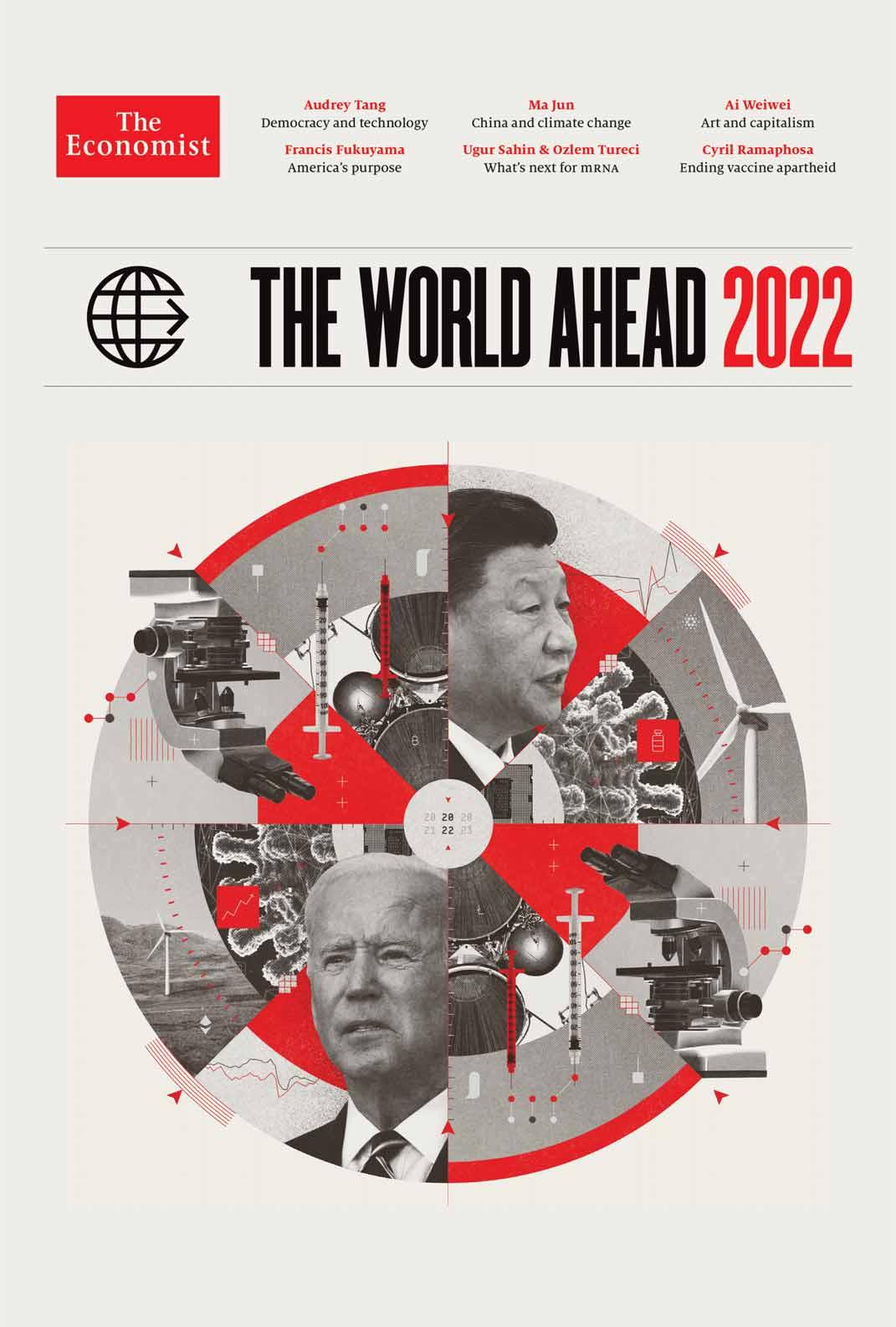In
the South Caucasus, output is projected to grow by 5.6 percent in 2022—the fastest among the ECA subregions.
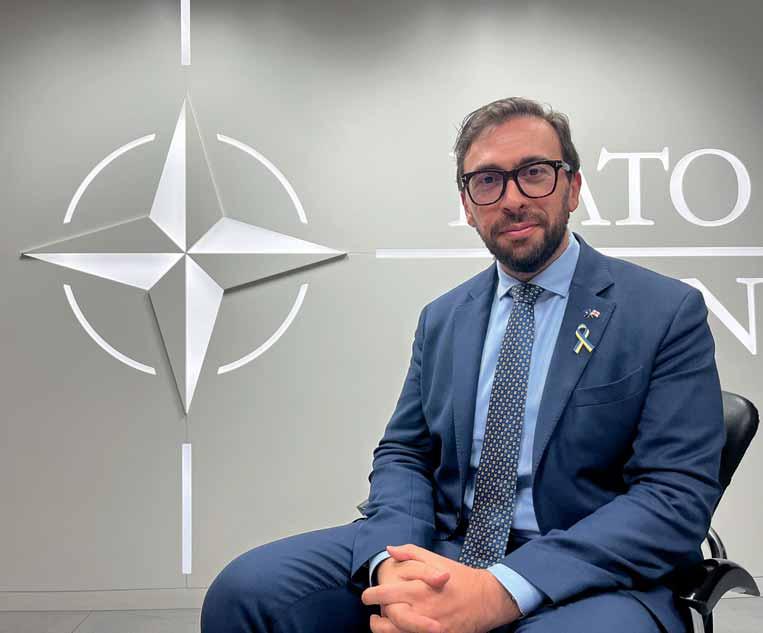
In sight of the double-digit growth during the first eight months of the year, real GDP growth projections for Georgia in 2022 have been increased to 8.8 percent (instead of projected 5.5 percent), the highest in the ECA region. This has been supported by a strong recovery in domestic demand and a surge in net money transfers.
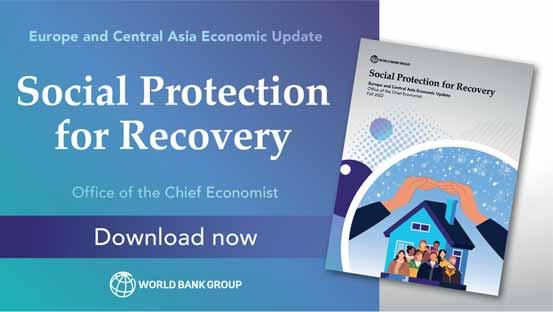
Growth in Georgia would slowdown in 2023, to an estimate of 4.2 percent.
The deceleration reflects weakening momentum after a strong rebound in 2022, the slowdown in the European Union, and a sharper-than-expected contraction of 2023 output in Russia.
War Updates: Ukrainian Forces Break through Russian Defensive Positions in Kherson
BY ANA DUMBADZEthe villages of Zoltaya Balka and Alexsandrovka.
Ukraine’s
counteroffensive in the east and south of the country continues to build momentum, with President Zelensky announcing this week that there were “new liberated settlements in several regions.”
On Monday, Ukrainian forces saw more successes on the battlefield, pushing through Russian defenses in the south of the country, as well as consolidating their hold on territory around Lyman in the eastern Donetsk region, and looking to push further into neighboring Luhansk.

President Putin announced Russia was annexing both regions last Friday, as well as Kherson and Zaporizhzhia in the south, but Moscow’s hold on them looks increasingly fragile, with none of the regions fully occupied by Russian forces.
Russia no longer has full control of any of the four provinces of Ukraine it says it annexed last week. The Russian military has acknowledged that Kyiv’s forces broke through in the Kherson region. It said the Ukrainian army and its “superior tank units” had managed to “penetrate the depths of our defense” around
Ukraine “fully cleared” Russian forces from the key eastern city of Lyman, a day after Moscow admitted its troops had pulled out after they were encircled. Lyman’s recapturing by Ukrainian troops is Russia’s largest battlefield loss since Ukraine’s lightning counteroffensive in the north-eastern Kharkiv region in September.
Russias’s Ministry of Defense spokesperson, Igor Konashenkov, said Russian troops had occupied what he called a “pre-prepared defensive line”. His comments are an admission that Ukraine’s southern counter-offensive is dramatically gaining pace, two months after it began. Ukrainian brigades appear to have achieved their biggest breakthrough in the region since the war started, bursting through the frontline and advancing rapidly along the Dnipro River.
President Zelensky said Ukraine is not just experiencing military success in Lyman, but also in Kherson. In his nightly statement, he said Ukraine’s forces have liberated the small Arkhanhelske and Myrolyubivka settlements in the Kherson region. Vladimir Saldo, head of the Russian-imposed authority in the region, admitted that Ukrainians had gained some ground.
Ukraine’s military has said its forces also recaptured the village of Torske near Lyman in the Donetsk region on Sunday. Russian forces who have been forced to retreat towards Luhansk’s city of Kreminna were hit “with fire” by Ukrainian missile units, artillery, and air forces.
The Kremlin is still determining which areas of occupied Ukraine it has “annexed”, Vladimir Putin’s spokesperson said. Putin has vowed to protect Russia’s newly claimed territories using “all means at its disposal”, indicating a potential nuclear strike.
The Kremlin also said Russia favors a “balanced approach” to the issue of nuclear weapons that is not based on emotion. The remarks by Kremlin spokesperson Dmitry Peskov come after Ramzan Kadyrov, the Kremlin-appointed leader of the Chechnya region, said Moscow should consider using a “low-yield” nuclear weapon in Ukraine.
The head of the Russian-occupied Zaporizhzhia nuclear power plant in Ukraine has been released, according to the head of the International Atomic Energy Agency (IAEA), Rafael Grossi. Ihor Murashov was detained last Friday by a Russian patrol as he travelled from the Zaporizhzhia plant to the town of Enerhodar, according to the state-owned company in charge of the plant.
ON THE REFERENDUMS AND JOINING NATO
The EU has summoned Russia’s top diplomat in Brussels in protest at President Vladimir Putin’s “illegal annexation” of four Ukrainian territories. The move is part of a coordinated exercise with EU member states, Peter Stano, a foreign affairs spokesperson for the bloc, said.
A record 83% of Ukrainians would like their country to join the NATO military alliance, according to a new poll. Only 4% said they would vote against joining NATO and 9% said they would not vote.
Earlier on Friday, Ukrainian leader Volodymyr Zelensky said that Ukraine has made an “accelerated” bid to join NATO.
The announcement came on the same
day Russia annexed four Ukrainian territories after a series of referendums that most western governments have labeled a “sham.”
“We are taking a decisive step by signing Ukraine’s application for accelerated accession to NATO,” Zelensky said on his Telegram channel.

However, it wasn't immediately clear what an "accelerated" application would mean, as ascension to NATO requires the unanimous support of the alliance members- 30 in all, and Ukraine is unlikely to join anytime soon, as being a country already at war complicates the request.
The heads of nine European NATO members on Sunday issued a joint statement backing a path to membership for Ukraine in the US-led security alliance, calling on all 30 NATO nations to ramp up military aid for Kyiv. The nine NATO countries in Central and Eastern Europe are fearful that Russia could target them next if it isn't stopped in Ukraine, and urged a response to the annexation.
The leaders of Czechia, Estonia, Latvia, Lithuania, North Macedonia, Montenegro, Poland, Romania and Slovakia published a statement on their websites Sunday saying: “We support Ukraine in its defense against Russia’s invasion, demand (that Russia) immediately withdraw from all the occupied territories
and encourage all allies to substantially increase their military aid to Ukraine."
It said the leaders “firmly stood behind the 2008 Bucharest NATO Summit decision concerning Ukraine’s future membership.” At the 2008 summit, NATO members welcomed Ukraine and Georgia’s aspirations to join, but declined to provide a clear timeline for the two countries’ possible ascension. Sunday's letter didn't mention a timeline.
Asked Friday about Zelensky’s application for accelerated NATO membership, the White House national security adviser Jake Sullivan said the application process in Brussels “should be taken up at a different time.”
NATO Secretary-General Jens Stoltenberg was noncommittal when asked about the Ukrainian appeal to join.
Dmitry Medvedev, deputy head of Russia’s Security Council chaired by Putin, derided the move, saying that Zelensky’s request amounts to “begging NATO to accelerate the start of World War III.”
Spurred into action by security concerns over Russia’s invasion, Finland and Sweden officially applied to join NATO in May using an accelerated procedure. Most member countries have already ratified their applications and the two Nordic nations are on track to join in record time.
EU Reaches Agreement on 8th Package of Sanctions against Russia
BY SOPHIE HODLERTheEuropean Commission on Thursday afternoon welcomed the approval of the eighth package of tough measures on Russia by the European Council. This package, which is closely coordinated with international partners, responds to Russia’s ongoing escalation and illegal war against Ukraine, including illegal annexation of Ukrainian territory based on sham “referendums,” mobilization of additional troops, and issuing open nuclear threats.
Additional export restrictions have been imposed, aiming to limit Russia’s access to military, industrial, and technological assets, as well as its defense and security sectors. This includes a restriction on the export of coal and specified electronic components, aviation-related technical products, and certain chemicals. The Anti-Torture Regulation now includes a restriction on the export of small guns and other commodities.
Further import restrictions totaling about €7 billion have been agreed upon. It prohibits the import of Russian fin-
ished and semi-finished steel goods, equipment and appliances, plastics and appliances, cars, textiles, footwear, leather, ceramics, some chemical items, and nongold jewelry.
The package unveiled Thursday signals the start of the EU’s implementation of the G7 accord on Russian oil exports. While the EU’s embargo on buying Russian seaborne crude oil remains in place, the price cap, if adopted, would allow European operators to undertake and assist the shipping of Russian oil to third countries as long as the price remained below a preset “cap.” This will serve to lower Russia’s income even further while maintaining global energy markets stability through ongoing deliveries. It will fight inflation and stabilize energy costs at a time when high expenses, notably higher fuel prices, are a major issue for all Europeans.
This policy is closely coordinated with G7 partners. Going into effect after 5 December 2022 for crude, and 5 February 2023 for refined petroleum products, pending a subsequent Council resolution.
The current package prohibits EU nationals from serving on the boards of directors of some state-owned firms. It also prohibits any dealings with the Russian Maritime Register, adding it to the
list of state-owned firms barred from conducting business.
Prohibiting all crypto-asset wallets, accounts, or custody services, regardless of the value of the wallet strengthened existing crypto-asset bans. The package broadens the spectrum of services that may no longer be offered to the Russian government or legal entities created in Russia, including IT consulting, legal
advice, architectural, and engineering services. These are crucial and may damage Russia’s industrial capabilities because they are heavily reliant on importing these services.
More people and organizations have been sanctioned. This is directed towards people participating in Russia’s occupation, illegal annexation, and bogus “referendums” in the occupied areas. Indi-
viduals and businesses working in the defense industry, such as high-ranking and military officials, as well as enterprises assisting the Russian armed services, are also included. The EU also continues to tackle those that propagate war-related misinformation.
The EU’s restrictive measures are aimed at top decision-makers, oligarchs, senior military officials, and propagandists who have been accused of undermining Ukraine’s territorial integrity.
The geographical scope of the restrictive measures imposed in response to the recognition of non-government controlled areas in Ukraine’s Donetsk and Luhansk oblasts, as well as the deployment of Russian armed forces in those areas, has been expanded to include all non-government controlled areas in Ukraine’s Donetsk, Luhansk, Zaporizhzhia, and Kherson oblasts.
The EU has proposed a new listing criterion that will allow it to penalize those who aid violations of the prohibition on penalty circumvention.
The European Commission claims the EU’s sanctions on Russia are working, undermining Russia’s capacity to produce new weapons and maintain current ones, as well as obstructing material transfer.

Bonnie Jenkins: We’ve Been
Dismayed to See Personal Attacks on Amb. Degnan, the Embassy
We’ve
been dismayed to see personal attacks on Ambassador Degnan and the Embassy, US Under Secretary for Arms Control and International Security Bonnie D. Jenkins told reporters.

She claimed that these attacks are part of a bigger pattern of disinformation aimed at obscuring the truth and the realities of the current crisis in Europe that one man has created.

“I look forward to delivering a message of strong support from Washington for the tremendous work Ambassador Degnan and her Embassy team have done to help advance Georgia’s Euro-Atlantic aspirations, and to the Georgian government for their collaboration and partnership in working with us in addressing these concerns.
“These efforts have not come easily, especially of late, where we’ve been dismayed to see personal attacks on Ambassador Degnan and the Embassy. Let us be clear, this is part of a bigger pattern of disinformation aimed at obscuring the truth and the realities of the current crisis in Europe that one man has created.
“The United States will always honor Ukraine’s internationally recognized borders, just as we will always recognize Georgia’s sovereignty and territorial integrity within its internationally recognized borders. Together, we should all be standing by supporting the people of Ukraine as they fight for their freedom and sovereignty,” Jenkins said.
Russian Immigration: A Double-Edged Sword
potential injury or death rate in Ukraine. But bringing those views may conflict with the views of many young Georgians.
This conflict has the potential to manifest into violence. According to some OSINT sources online, there have already been instances where Georgians and Russians have clashed, with injuries.
Businesses have taken steps to force them to denounce Moscow’s actions in Ukraine and people have held posters and marches to inform them that “Russian deserters” are “not welcome.”
It may be easy to chalk these actions up to xenophobia based on old differences. The reality is that it may formulate in a way that could result in conflict.
Russia has used the protection of its people, both citizens and ethnicities, as a caucus belli in Ukraine, Georgia, and Moldova. The process for another annexation of Georgia is easy to see should complaints of ill treatment by Russian citizens increase in number.
With the massive influx, naturally resistant Georgians are likely to lash out. This backlash to the migration is almost certainly to cause a wave of concern in the Russian social media camp. This will undoubtedly make its way to the Krem-

lin’s information channels. It’s all too easy to use this as leverage against Tbilisi.

The current Georgian government would likely be unwilling to reply in a way that matches the actions on the street. While Parliament may say they apologize and will prosecute the offenders, it won't match the response of the citizenry. This will assuredly spark more ire from the Kremlin.
That same caucus belli being used, an operation to protect Russian peoples in Georgia is not off the table. While some may say this is unreasonable and wouldn't match a rational flow of decision making from Moscow, this is exactly the point. Putin has not acted rationally, including the very invasion of Ukraine and the strategic decisions employed during the ongoing campaign.
Putin’s erratic and unpredictable nature in the past year has defied predictions. What comes next for Georgia is likewise uncertain. Despite the warm nature of Georgians and an acceptance for foreign citizens, the threat must be faced frankly. Like the Mother Georgia statue, the newcomers must answer: Do you come in peace or with malice?
BY MICHAEL GODWINAmongsome of the first things tourists marvel at in Georgia is the majestic statue of “Kartlis Deda” or Mother Georgia. The immense aluminum statue, erected in 1958 to honor the city's 1,500th anniversary, is that of a woman clad in Georgian dress holding a sword and a bowl of wine. For those who come as friends, the wine, and for those who come as hostiles, the sword.
Such a succinct statement characterizes much of Georgia’s history and interactions with its neighbors. However, Georgians have had a particular resistance to Russian influence, largely cemented by the 2008 invasion of the Kremlin’s forces. And after Moscow’s recent actions, the influx of migrants from the other side of the Caucasus has sparked ire from many in the nation.
Protests, politician’s statements, and even internet memes have captured the spirit of many who oppose the newcomers. A popular image has gone viral in the country, depicting a Russian armored column moving to Tskhinvali in 2008 alongside the image of Russian civilian traffic attempting to cross the Lars border checkpoint. Such a comparison has obvious implications.
The influx of Russian citizens is more of a mixed group than those who left after the initial invasion in February. At that time, many left purely out of disgust of the Kremlin’s actions and over aggression against what many online characterized as fellow Slavs. The groups of people fleeing the country now have more personal reasons for emigration: Self-preservation.
As evidence of this, human rights and legal groups in Russian have been inundated by requests for support. Sergei Krivenko, who runs a group of around 10 lawyers called "Citizen. Army. Law.", said his office was working overtime to
meet the demand.
"We are working round the clock. People are being torn from their normal lives," Krivenko said. "This is a mobilization without a time limit during a war. It could last months or years. People may not return, and leaving the army is pretty much impossible. The only way is death, injury or prison for disobeying orders."
Dmitry Lutsenko, the co-owner of an organization named "Release" that offers legal advice and information for potential service members, said "the best way to avoid conscription is to leave Russia now.” He advised that the alternative is to “avoid signing a summons, avoid military offices. The legal punishment for not going is a small fine and I don't know of anyone who has been fined yet."
This self-preservation has caused many to find refuge in Georgia, regardless of their views on the “special military operation” in Ukraine. It's understandable that a young family, with high overhead costs and growing young children, would want to avoid military service and a high
The Peanut Farmer
political elite.
OP-ED BY NUGZAR B. RUHADZEHis
famous thirty-two-teeth smile was all over America, if not the entire world, when he started campaigning for the most famous and influential job on the planet in the mid-1970s. ‘Jimmy Who?’ was the household question in his early campaign, for he had dashed into American summitlevel politics right out of the blue at a time when the American people had not yet fully recovered from the Watergate fiasco, and when the Nixon-ridden Whitehouse was temporarily taken over by neither-fish-nor-flesh vice-president Ford. Jimmy presented himself to the expectant public as a peanut farmer, because he indeed owned a peanut farm, and by means of using that folksy image, he wanted to distinguish himself from the detested-at-that-time Washingtonian
Yes, we are talking about the 39th President of the United States, James Earl Carter Jr., the longest-living American president in history. This wonderful man turned 98 on the 1st of October, and I had no way to stand aside from the exceptional event. He is just two years short of officially acquiring the honorary appellation of a centenarian, and I have no doubt he will. Frankly, one of the reasons for my enthusiasm is that I spent time at Jimmy and Rosalynn Carter’s house at Plains, Georgia, together with my family, when I served as a soviet Georgian TV journalist in Atlanta in the late eighties and early nineties. I remember we had a lot of fun together. I even attended the Sunday school session led by President Carter, the ‘outspoken Christian’, as his grandson Jason (currently the head of the Carter Center board) describes him.
Being very happy with their personal life, public image and valuable legacy,
Jimmy and Rosalynn Carter have spent 76 years in a loving and dedicated connubial relationship, working together ceaselessly on promoting democracy, peace, human rights and conflict resolution, monitoring elections, and advancing public health in the developing world. Based on what the family members are saying, they are at peace and happy with where they have been and where they are going.
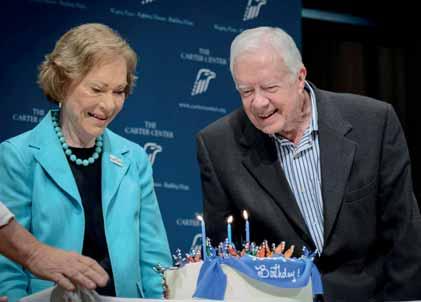
According to the Carter Center leaders, the aging but still optimistic and spirited president who survived a cancer diagnosis in 2015, is enjoying congratulatory messages from his well-wishers around the world, but he is mostly looking forward to a day that suggests watching on TV his favorite baseball team, the Atlanta Braves; he also reads and watches the news daily, and accepts calls or visits from political figures.
Says Jason Carter: "The people that he feels the closest connection with now are the folks in Plains, at his church and other places, but his partner number
one, two and three is grandma; he has outlived friends, many of his advisers, and the people that he accomplished so much with in the past, but grandpa and grandma have never been lonely because they’ve always had each other."
Isn’t this amazing! Having lived that great life of a famous and exemplary
couple, having done so much to promote the state and public cause, having aged with that outstanding human dignity, the tight, tough and inseparable Carter couple are still working and doing their due job to the benefit of their family and their beloved country, when the man is 98 and the wife is 95. Congrats!
Occupied Abkhazia: The Attack on the Civil Sector and International Organizations
humanitarian aid, conferences, educational trainings, and active work with young people.
Inal Ardzinba's request is that the main field of their activities should be humanitarian and not include political projects. Further, that these organizations should agree on projects on the territory of Abkhazia in advance and submit reports on their implementation, lists of employees, and data on sources of financing. There is a similar requirement when it comes to the preparation of meetings with the Georgian side or the implementation of any kind of project.
was being carried out in the village of Primorskoe, Gudauta, near the Russian military base. Later, Ardzinba suggested that the project should be implemented in another place.
• On September 22, 2022, another Ardzinba target appeared in the Berghof Foundation. He urged the residents of the occupied territory not to cooperate with the German foundation. According to Ardzinba, meetings and online discussions between Abkhaz and Georgian youth had been held for years at the initiative of this foundation.
for Commonwealth of Independent States Affairs, Eurasian Integration and Relations with Compatriots of the Russian State Duma. Ardzinba also attended the meeting. The Chairman of the Committee, Leonid Kalashnikov, reprimanded the Abkhazian side for the slow pace of adopting the legislation on "foreign agents".
MAIN CONCLUSIONS
BLOG BY MAMUKA KOMAKHIA FOR GFSISAfterthe end of the 1992-1993 Abkhazian war, the local civil sector in the de facto Republic of Abkhazia became a reasonably considerable force, which, with the support of international organizations, has been actively involved both in the daily life of Abkhazia and in the Georgian-Abkhazian civil dialogue process for the past three decades. This did not change even after the 2008 Russian-Georgian war. However, from November 2021, the activities of non-governmental organizations in the occupied Abkhazia region have been under threat, with the production of such policies intensifying, the ultimate goal of which is assume full control over the activities of the local civil sector and international organizations.
THE LAW ON “FOREIGN AGENTS”
International organizations do not recognize Abkhazia as a subject of international law, however, Western organizations and foundations, with the consent of the Georgian government and with the involvement of the local civil sector, are actively implementing various projects on the occupied territory. Those in Abkhazia have always feared that Official Tbilisi could at any moment stop the activities of international organizations in the de facto republic and, therefore, access to Western funds, yet the threat comes from another side - from Russia.
On November 12, 2020, the ‘Program for the formation of a single social and economic space between the Russian government and the de facto authorities of Abkhazia, based on the harmonization of the legislation of Abkhazia with the legislation of Russia’ was approved. As per the 37TH measure of the program, the Abkhazian “legislation” should come into conformity with the Russian legislation, which will regulate the activities
of non-profit organizations and “foreign agents.”
Since 2012, Russia has been granting the status of “foreign agent” to those organizations and individuals who receive support from abroad or are under foreign influence. This issue became relevant in Abkhazia in November 2021, when Inal Ardzinba, a former high-ranking official of the Russian Presidential Administration, was appointed as the Minister of Foreign Affairs of the de facto regime.
WHAT DOES ARDZINBA DISLIKE AND WHAT DOES HE DEMAND?
In Abkhazia, they believe that Inal Ardzinba is a “man of Moscow” who has good connections and support in the Kremlin. Control over the activities of non-governmental and international organizations is dictated by Russia, which wants to establish Russian rules in the de facto republic. Ardzinba has to show that he can pursue Russia's interests and, therefore, gain the status of the most important person in the Russian-Abkhazian relationship.
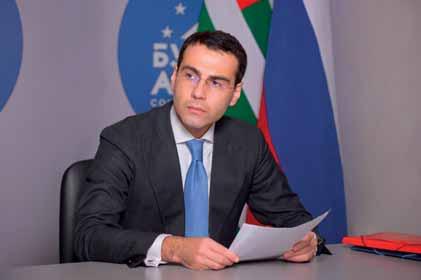
According to Ardzinba, they are already working on the development of a draft law on non-profit organizations and public associations. The purpose of the draft law is to increase the activity and financial transparency of these organizations so as to ensure non-interference in the internal activities of the de facto republic, which actually means establishing full control over the activities of the local civil sector and international organizations.
Ardzinba has made many critical remarks towards international organizations. As per his assessment, the activities of these organizations are aimed at obtaining intelligence and promoting the implementation of the Engagement without Recognition Strategy (referring to the European Union's strategy, which includes involvement in the conflict regions of Georgia in terms of providing humanitarian and economic aid, without recognizing the status of those regions).
He claims the main goal of these organizations is the soft integration of Abkhaz society into Georgian society through
ARDZINBA’S CAMPAIGN OF ATTACK
Inal Ardzinba has made direct attacks on international organizations. Below are some examples:
• On November 29, 2021, Ardzinba summoned representatives of international non-governmental organizations working on the occupied territory of Abkhazia, who were directly requested to conclude a mandatory agreement with the “ministry” on all planned projects.
• A meeting between Ardzinba and a representative of the United Nations Development Program in Abkhazia on January 19, 2022 was particularly scandalous. Ardzinba said that some of the projects being implemented in Abkhazia were unacceptable. In particular, talks touched upon the sociological research conducted on the territory of Abkhazia in 2021, which dealt with internal political issues of Abkhazia and studied the possibility of establishing relations with the Georgian side. Ardzinba also considered it unacceptable to implement the COBERM project, which aims at establishing a direct dialogue between Abkhazians and Georgians at the level of experts and young people.
• On April 8, 2022, at a meeting with representatives of UN agencies and international non-governmental organizations, Ardzinba announced the suspension of ‘Improving local governance with the help of inclusive approaches in the field of development’ – a project of the Movement Against Hunger international organization. The Abkhazian side expressed displeasure that the involvement of Abkhazian and Georgian youth in intercultural dialogue was planned within the project, about which they had not been provided with sufficient information.
• On September 12, 2022, French citizen Tiffen Lucas was accused of “obtaining intelligence information” and was declared a persona non grata. Lukas was in charge of the United Nations Food and Agriculture Organization's project in Abkhazia, which was aimed at preserving local grape varieties. Ardzinba did not particularly like that the project
RESPONSE OF NONGOVERNMENTAL ORGANIZATIONS
At the initial stage, Ardzinba's initiatives were met with harsh evaluation by local civil society. Hundreds of people signed an appeal to the de facto authorities, expressing their concern that the debate over the “foreign agents” law had reached a new level, and that the adoption of such a law would bring negative results and damage the international image of the de facto republic. Yet, recently, protests on this issue have calmed down and civil sector discontent is less heard in the public space.
The “Public Defender,” Asida Shakril, also disagrees with the adoption of the law on “foreign agents.” On June 8, 2022, during his annual report before the de facto parliament, he said that the public is confused by the idea of the need to adopt a law on “foreign agents,” one which does not reflect the Abkhazian reality. According to Shakril, this initiative is aimed at on the one hand limiting Abkhazia's external ties, and on the other hand, limiting rights and freedoms within Abkhazia.
WHAT OTHERS SAY
Unlike Ardzinba, other leaders of the de facto regime are less critical of the activities of international organizations. They do not publicly criticize their presence, and see opportunities for developing relations with the outside world. For example, on April 13, 2022, de facto Prime Minister Alexander Ankvab hosted a delegation of the United Nations Development Program. Ankvab thanked the guests for their help in the fight against the pandemic and discussed issues of cooperation in the field of healthcare and agriculture.
WHAT THEY SAY IN RUSSIA
As a rule, Moscow avoids criticizing the de facto government of Abkhazia in the public space. In this regard, most active are the Russian “ambassadors” in Abkhazia, who periodically make critical statements. Strangely, a lot of criticism was heard on May 25 at a Russian-Abkhaz working meeting of the Committee
• Attempts to limit the activities of local non-governmental and international organizations in Russian-occupied Abkhazia are aimed at establishing complete control over them, which is carried out on the Kremlin’s order and is due to a desire to introduce the Russian model in the occupied region. Such activity on the part of Russia comes from the fact that the activities of Western organizations in Abkhazia and other occupied regions are perceived as a threat to Russia's interests.
• Inal Ardzinba is a leading figure in this process. As soon as he was appointed as “minister,” he has been trying to stop projects financed by the West. If full control is established over the activities of non-governmental and international organizations, its influence will increase both in the de facto republic and in relations with Russia. Passing the law on “foreign agents” will demonstrate that he has managed to do something in a short time that other members of the de facto government have not been able to do.
• Ardzinba's activity in the current process, while other representatives of the de facto regime are more moderate on this issue, indicates that the local political elite has a different opinion, although expressing it openly means going against Russia, so they prefer to remain silent.
• If the law on “foreign agents” is adopted, the local civil sector and international organizations will be forced to continue their activities under a number of restrictions, and only on apolitical and neutral issues. This will have a negative impact on local, more or less developed civil organizations, as well as on the prospect of bilateral dialogue/ relations with the Georgian side.
WHAT COULD PREVENT THIS?
The intensification of the campaign against international organizations and relatively passive opposition within the de facto republic on this issue indicates that the situation for the local civil sector and international organizations is set to become even more difficult. The most important factor that can stop/slow down this process is the defeat of Russia in Ukraine, during which this issue will lose its meaning and relevance for the Kremlin.
NATO’s Alexander Vinnikov on Encouraging Georgia to Get Back to its High Tempo Reform Implementation
EXCLUSIVE INTERVIEW BY EREKLE POLADISHVILIBecoming
a member of NATO is one of several goals generations of Georgians are eager to achieve. Yet, the unsuccessful attempts of former and current ruling parties to get even the Membership Action Plan (MAP) raises the question - Who is to blame?
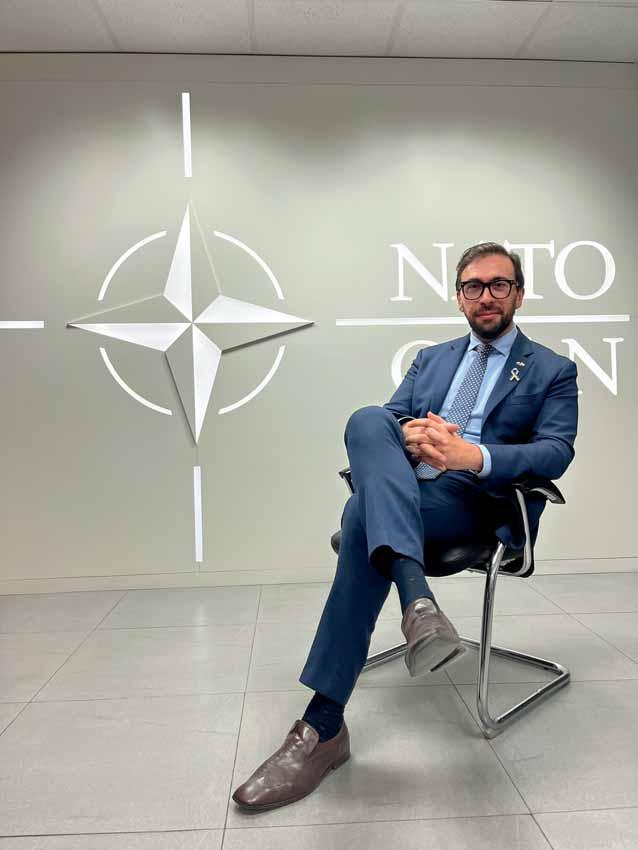
Are the parties to blame who never managed to run the country without turning their back on democracy, or is it the NATO leaders who didn't listen to President Saakashvili’s warning about the absolute evil nature of Vladimir Putin back in 2008? There's no doubt that someone or something is to blame for Georgia’s current back-step. GEORGIA TODAY met the head of the NATO liaison to Georgia, Alexander Vinnikov, to get answers to the questions many Georgians have been waiting for.
BEFORE THE AUGUST 2008 WAR, AT THE BUCHAREST SUMMIT, PRESIDENT SAAKASHVILI ASKED NATO TO GIVE GEORGIA THE MAP. IN RESPONSE, IT RECEIVED A REJECTION AND PUTIN’S FIRST WAR. DO YOU CONSIDER THIS DECISION A MISTAKE?
It's important to remember that the Membership Action Plan, or MAP, is not the same as membership. It's an invitation to carry out a number of reforms that will bring the aspirant country closer to NATO. In fact, at the Bucharest Summit in 2008, Allied heads of state and government decided that Georgia would be a member of NATO in the future. Now it's important for Georgia to focus on getting ready for membership. That implies also carrying out and implementing a range of democratic reforms. Critical are reforms in the area of the rule of law, electoral reforms and freedom of media, as well as the further transformation of Georgia's security and defense sector. It's important to note that NATO continues very close political and practical support for all of those efforts, and NATO's support was further enhanced at the Madrid Summit. We are now in the process of implementing those decisions.
YOU SAID GEORGIA MUST PREPARE FOR MEMBERSHIP. DOES THAT MEAN WE DON'T HAVE TO WAIT FOR THE MAP?
In the Bucharest Summit decision, MAP is an integral part of becoming a member. However, we consider that Georgia already has all the tools at its disposal to progress and get closer to NATO. The Annual National Program covers the same areas as the MAP. Decisions about MAPs are political decisions to be taken by all NATO Allies by consensus. We saw in the cases of Finland and Sweden that their membership applications were endorsed very quickly by a political decision because they were fully ready and didn't need to carry out any significant reforms, as they were long-established democracies and EU member states.
14 YEARS HAVE PASSED SINCE THE BUCHAREST SUMMIT. WHAT WERE THE OBSTACLES? WHY DID THE COUNTRY NOT MANAGE TO FULFIL THE REFORMS AND REQUIREMENTS REQUESTED BY NATO?
Georgia has carried out an impressive range of reforms, particularly when it comes to its defense forces and the wider
security sector. However, more needs to be done. I would highlight the issue of democratic oversight of the security sector institutions. There's still more that should be done to align the Georgian system with the principles of NATO member states. We encourage Georgia to recover the momentum of its reforms, something which has been somewhat reduced, I would say, in the last couple of years. We are encouraging our partners to get back to that high tempo of reform implementation.
THERE ARE COUNTRIES WITHIN NATO THAT DO NOT MEET ITS REQUIREMENTS. ISN'T IT A DOUBLE STANDARD TO ASK GEORGIA TO MEET THOSE STANDARDS WHEN OTHERS DON'T?
I think it's important to remember that NATO is ultimately an alliance of values. All our Allies share the values upon which the organization was founded in 1949. Values include democracy, individual liberty, the market economy, human rights, fundamental freedoms and the commitment to come to each other's aid if one Ally were to be the subject of an attack. Any country wishing to join the Alliance has to be willing and able to fulfil the commitments of the Washington Treaty. But, ultimately, any decision on membership, as I already said, remains a fundamentally political decision. It's about Allies deciding by consensus whether a country joining the Alliance will ultimately strengthen the Alliance's collective security, because that is the primary purpose of NATO. It's a defensive alliance which seeks to protect the security and safety of our population of over one billion people currently living in NATO territory.
GEORGIANS HAVE A VIEW THAT NATO IS FOR THE SECURITY OF GEORGIA AND THE EU IS FOR DEMOCRACY AND ECONOMIC IMPROVEMENT. WHY IS NATO ALSO ASKING FOR DEMOCRACY?
Of course, there are differences, and we each have our role to play. But, ultimately, we're based on, and share, the same values. We share many member states, as you know, which is why the requirements for acceding to both organizations in some ways overlap. There are many similarities, which is why it should be seen as encouragement by our Georgian partners. Making progress in the reform areas I mentioned will strengthen the country and bring it closer to both NATO and, I think, EU membership.
UNLIKE UKRAINE, GEORGIA IS SMALL AND, LET'S BE CLEAR,
VULNERABLE TO RUSSIAN AGGRESSION, POSSIBLY AT ANY GIVEN MOMENT. DON'T YOU THINK THAT NATO SHOULD ACCELERATE THE PROCESS OF ARMING GEORGIA AS SOON AS POSSIBLE?
At the Madrid Summit, our leaders took historic decisions to proceed with the most significant strengthening of NATO's defense posture since the end of the Cold War, with many more troops, specifically in the eastern part of the Alliance, and rapid reaction forces that were also significantly enhanced. The support for Ukraine was reconfirmed again, and our leaders pledged to continue to support Ukraine for as long as it takes to ensure that Ukraine can prevail in its defensive actions against Russia's aggression to defend its sovereignty and territorial integrity. But we also made decisions to strengthen the resilience of those partners we consider most at risk of further Russian threats and interference. I think all Allies fully realize that Georgia finds itself in a difficult position and environment, particularly following the Russian invasion of Ukraine. This is recognized,
and I believe that is why Allied leaders decided to step up their political and practical support to Georgia. I would note (as your question also includes a reference to armaments) that NATO, as an organization, doesn't own armaments. These are national assets. So any decision to supply armaments are national decisions for the Allies to take bilaterally.
SO, SOME PEOPLE IN GEORGIA MISUNDERSTAND WHEN THEY THINK NATO ITSELF HAS TO ARM THE COUNTRIES THAT ARE NOT MEMBERS. Yes. Those assets and capabilities are owned by NATO Allies, not by NATO itself as an organization. Still, I would encourage Georgia to strengthen its defense forces further, and we are helping Georgia with that. We are in close dialogue with the Georgian authorities regarding their needs, so we can adjust and tailor the decision made at Madrid and translate that into concrete deliverables, a concrete action plan of support, and that is what we're doing now. We are fully committed to strengthen-
ing Georgia's capabilities in that regard. But I wouldn't want to speculate on possible future actions to be decided by Allies because that is their prerogative.
Making progressin the reform areas will strengthen the country and bringit closer to both NATO and EU membership
We are in close dialogue with the Georgian authorities regarding their needs, so we can adjust and tailorthe decision made in Madrid
The Russian Double — Defeat and Decline
ANALYSIS BY EMIL AVDALIANIRussia
may now be in an era of irreversible decline. That, anyway, is what the longterm trends indicate.
Russia’s once-vaunted military is being mauled in Ukraine. It will either lose outright, or remain to fight a hopeless war for years to come. Despite September’s rigged referendums, its attempt to legalize its seizure of Ukrainian territory not only generated derision but was swiftly challenged in the most profound way, by the Ukrainian armed forces liberating swaths of land from the Russian invader.
These defeats have reverberated wide and deep into Eurasia. In Central Asia, Kazakhstan, Russia’s critical link to the region, is worried about the Kremlin’s intentions. Its Russian-populated northern regions could easily become the Kremlin’s next geopolitical adventure if the war in Ukraine ends with some semblance of Russian success. This is encouraging its leaders to play its Chinese card: Xi Jinping obliged during a visit on September 14, noting rather tartly that “we will continue to resolutely support Kazakhstan in protecting its independence, sovereignty, and territorial integrity.”

But perhaps the biggest changes are
taking place in the South Caucasus, where Armenia and Azerbaijan, two long-time rivals, are adjusting to the new reality created by a wounded and diminished Russia even as they seek to navigate the continuing repercussions of the Second Nagorno-Karabakh War of 2020. Azerbaijan sees Russia’s preoccupation with Ukraine and sought to take the maximum advantage. Armenia, which was refused Russian military aid during the recent fighting, has been under fierce Azeri pressure to recognize its territorial integrity, thus de jure renouncing its hope
that Nagorno-Karabakh might be a separate entity.
Negotiations between the two sides have been encouraged by the European Union, but the signing of a peace treaty remains elusive and is likely to remain so for the foreseeable future. The EU lacks the clout to force it through, while Russia is not yet sufficiently enfeebled to be ignored. From this flows an ambiguity that is dangerous for the South Caucasus states. As peace efforts stumble, Armenia and Azerbaijan are preparing for a new round of competition, and
the possibility of more fighting.
Armenia, the loser in 2020 and still badly bruised by the defeat, has just announced a 47% military budget increase for next year. There is little detail on the systems it seeks and the total of $1.2bn is still dwarfed by Azerbaijan’s $2.6bn billion defense budget, yet the trajectory is clear. As Russia is unable to prevent future escalations in the South Caucasus, Armenia has to become more self-reliant in preparation for future clashes.
The Russian inability or unwillingness to influence events is also pushing Armenia to search for a new arms supplier. It has little choice given that arms deliveries from Russia to Armenia have been delayed by nearly a year, another indication of inadequate military industrial capacity.
So step forward India. The two countries have signed an agreement worth some $245m for the purchase of Indian artillery systems and anti-tank rockets. India’s involvement might be surprising to many, but its rivalry with Pakistan, which supports Azerbaijan (and has not even recognized Armenia’s existence) is now silently spilling over into the South Caucasus.
Moreover, Armenian analysts and even politicians are now more vocal in their criticism of Russia, emphasizing the need to reconsider Armenia’s basic strategy.
The Russia of 2022 is not the Russia of the 1990s, when major treaties were agreed
between the two countries. It is now increasingly clear to the Armenian leadership that a defeated Russia could be a serious liability. At the heart of this reassessment is the role of the Collective Security Treaty Organization (CSTO), which failed to intervene when Armenia was under threat, and the Russian military bases on Armenian soil. Both pillars of supposed Armenian security are now crumbling.
Quite apart from Russia’s current military weakness, deficiencies in Russian efforts are also related to the Kremlin’s disingenuousness in the South Caucasus. Chaos is what Russia feeds on. Manageable chaos is even better.
Russia’s influence was flagging even before its all-out invasion of Ukraine. Turkey’s entrance into the region’s affairs is a major factor, while the EU’s re-emergence as a negotiating force has also hit Russian prestige, with every summit of Armenian-Azerbaijani leadership this year being held under Brussels’ auspices and none taking place in Moscow.
Russia is losing. It has increasingly fewer levers of influence even with its allies. And while Ukraine consumes all attention, the South Caucasus and Central Asia could be seen as a real gauge of how the Kremlin’s power is fading in the depths of Eurasia.
Emil Avdaliani is a professor at European University and the Director of Middle East Studies at the Georgian think-tank, Geocase.
From Prison to Platoon. Russian Conscripts Deployed in Ukraine

 BY MICHAEL GODWIN
BY MICHAEL GODWIN
Ascasualties continue to mount in Russia’s seventh month of its “special military operation” in Ukraine, finding willing fighters has become difficult. With much of the potential talent pool dead, wounded, or having left the country outright, the Kremlin is turning to unique avenues to find soldiers. Russian President Vladimir Putin has issued a decree to rectify this situation, but prior to this, other sources were already being tapped into.
The Russian prison system is full of the country’s worst. With a meteoric rise in drug-related crime since the early 2000s, it has been filled with violent gang members and addicts. With the system far from focused on rehabilitation, it houses these offenders in Spartan, Sovietstyle blocks with little to no view into the real world.
However, one man has decided to change this. With Russia’s defense minister admitting that the military had lost 5,937 service members, and foreign intelligence pointing to double or triple that number, one of Putin’s closest friends has decided to reach out to the country’s lost, imprisoned souls. This individual has an interesting and sordid history with the defense industry, inside and out of the Russian Federation.
Yevgeny Prigozhin is known commonly as “Putin’s Chef” due to his former business dealings with the Kremlin. He was the head of a large restaurant and catering conglomerate that serviced Putin’s lavish parties and dinners, where foreign dignitaries and royalty were present. In a recent admission, he said he was the one responsible for founding the infamous paramilitary group “Wagner.” Stylized as a private military company, or PMC, he led them on missions in Africa, Syria, Latin America, and Ukraine.
In each of these theaters, reports of brutal war crimes and extrajudicial killings would abound. It wasn't until their operations in Syria that the recruitment
call extended Prigozhin’s envisioned model of former special operations veterans and delved into the criminal underworld. To fill his ranks, he needed to find the hardest of souls, men that wouldn't question their lieutenant's horrific orders.
The brutal urban fighting in cities across northern Syria required men with hearts of steel and little to no conscience. Killing up close, personally, and repeatedly was a job description requirement. Prigozhin found his prime candidates in the dark, dank cells of Russia’s penitentiary system. Despite their performance, they proved themselves to be the type of fighting force he desired.
In the ongoing fighting in eastern Ukraine, the need for fighters that had no alternative in life became invaluable. Ukrainian resistance, steeled by a massive influx of Western arms, training, and intelligence, had rendered Russian advances ineffective. However, the “Chef” knew strength of arms and numbers could still take ground.
An independent Russian news outlet got a peek into the “Chef’s offer” from a family member of one of the first recruits of Prizhogin’s “assault units.”
“They told my relative, ‘It’s very hard to find the Nazis there, and they are very well-prepared. You will be at the forefront in helping to detect Nazis, so not everyone will return,’” the interviewee said. “At first they said about 20% would come back. Then, that ‘almost nobody
will return.’ Those who survive are promised 200,000 Rubles and amnesty. And if someone dies, they promise to pay their family 5 million Rubles. This is all only in words, nothing is fixed on paper.”
Men virtually press-ganged into brutally rigorous service with little to no hope of seeing the free world again.
While difficult to fathom for any Western analyst or observer, another video interview account only solidifies this.
A captured former member of Prizhogin’s fighters sheds interesting light on why these units operate with such insensitivity. After being sent to prison to serve a 24-year sentence, he was transferred to a special penitentiary. It was during his stay there that he met Prigozhin himself, sporting a “Hero of
the Russian Federation” medal.
After landing in the prison yard in a helicopter, Prigozhin began recruiting the men for service in Ukraine. Promising amnesty from their criminal charges, a 100,000 Ruble ($1,727.12 at the time of writing) salary, and 5 million Ruble ($86,355.80) for the family upon death, the deal was open to any convict. Concluding by saying the “Motherland is in danger,” Prigozhin left for a month to let the men think.
Upon returning, 92 convicts took him up on the offer. On August 25, the man whose relative spoke out above, and his compatriots, became the newest recruits of the Wagner private military corporation. After taking a plane to the southern city of Rostov, the man and his company took a helicopter to the Luhansk People’s Republic in Ukraine to begin their training.
Their training was rudimentary, at best. Basic loading and firing drills with their new AK-series rifles, as well as the issuance of their helmets, vests and knee pads. Any mistake, such as talking back to the instructors or rude remarks, the candidate would be “nullified.” This euphemism meant that any step outside the strictly observed lines of conduct would get one shot and be buried by a “special department” at the training camp.
Interestingly, the man states that for the majority of their time in the training camp, they were without ammunition for their rifles, possibly alluding to a lack
of trust despite the men being in a war zone. During an inspection of the camp by Prigozhin, all weapons were taken away from the men and stored under lock and key in a separate room.
For a week of training, the man was assigned to the 7th Assault Unit, a unit type he described as “cannon fodder.”
On September 2, his unit was assigned to move forward to a small town near the front. His first assignment, along with that of several of his comrades, was to retrieve the dead during the night. After transferring to an orchard with a fortified position, the man was again assigned to a team gathering the dead. It was at this point he deserted his unit after seeing internet videos of the Freedom of Russia Legion. While this ending may seem more for the benefit of his captors, it is the core of the story that lends itself to examination.
According to the man, Wagner was, and still is, recruiting men from the penitentiary system to fight on the front line. He explains that the recruits are not filtered by the crimes they commit, mentioning the large number of narcotics users and addicts that fill Wagner's ranks. As such, the state of these fighting men is likely to be sub-par.
Russia’s attempt to swell its ranks with fighters in a desperate attempt to hold territory may introduce a horrifying new face in the war. With most Western militaries, there is a significant vetting procedure to increase the professionalism and morality of the soldiers that fight wars. Russia seems to have abandoned this method in order to bolster the defenses of their crumbling front.
These men, with little to lose and a shattered moral compass, are more prone to war crimes, acting outside the command of their superiors, and deserting outright. While the phrase “quantity has a quality all its own'' has proven true, it's unlikely to change the highly kinetic front in Ukraine. Kyiv’s forces have already shown their tactical prowess and ability to out-maneuver Russian troops.
The admission of convicts reveals more than the Kremlin is likely to say on their own.
Web3 Bootcamp: Accelerating A Tech Workforce
Whether new to web3 and looking for a change or an experienced developer looking to expand their horizons, the program allows for all skill levels to grow. According to their site, the course is “full on and intense by design to help you learn fast.” GEORGIA TODAY spoke with the team to learn more about this upcoming “bootcamp” experience.
WHAT INSPIRED YOU TO HOST THIS EVENT?
We run a web3 startup called Pyme, which recently won a GITA grant. One of the biggest things we noticed when hiring and looking to grow our staff is that whilst a lot of people have an interest in web3, they do not have any experience in a work environment. The web3 bootcamp was born to help people get the foundations in one of the fastest growing tech industries.
WHY WOULD SOMEONE BENEFIT MORE FROM THIS PROGRAM THAN ANY OTHER?
INTERVIEW BY MICHAEL GODWIN
As
Georgia’s tech industry grows, the demand for professional training resources has exploded. Keeping the growing number of positions filled has been a challenge for recruiters as more and more companies
see the need for people competent in web3 technologies. To tackle this, one local startup has partnered with other like-minded entrepreneurs to offer a “web3 bootcamp.” Aptly named, it is designed to push candidates into highly needed careers with focuses in tech, marketing, and business.
CandiKandy and Pyme are looking to arm robust candidates with the tools necessary to jump-start their career.

We believe this is the first of its kind in the region. Where a lot of courses cover theory, we will be covering practical examples, case studies and handson experience. We know that we can help accelerate someone's tech career in web3 by challenging them in an immersive environment, fully focused on their development for four days. Each task is designed to challenge them to think in new ways, learn new skills and apply them in a commercial environment.
HOW DO YOU SELECT YOUR CANDIDATES FOR THE COURSE?
Most importantly, we are looking for
candidates with passion. Passion for their career, for their growth and development and passion for web3. We are big believers that skills can be taught. That we can help someone grow in the technical skills of their role whether in marketing, business or engineering. Yet we cannot teach hunger for success. We have an application process where we are looking for someone to demonstrate that hunger and passion.
WHO ARE THE PARTNERS AND WHAT DO THEY BRING TO THE “BOOTCAMP?”

The web3 Bootcamp is a collaboration between Pyme, CandiKandy and supported by GITA. GITA has been a huge help to us in our journey. Not only in the grant that we won, giving us the opportunity to think bigger, the encouragement to develop the tech community and support to grow Pyme. CandiKandy runs the best tech event in Tbilisi once a month focused on web3. Whilst a new event, the event grows every month and is helping to build and develop the growing web3 community in Tbilisi.
WHAT CAN A CANDIDATE EXPECT TO GAIN, OTHER THAN
WHAT THEY WOULD BY JUST WORKING IN THE FIELD?
The bootcamp is four intense days of learning, growth and real world experience. We have designed this program on the model of many programs that I have completed throughout my career. Following the four day bootcamp, candidates will have the opportunity to continue with Pyme on a paid internship. Our goal is that by the end of the four days someone has the skills and foundations to set them up to get ahead in their career. By the end of the 12 week internship, we believe that people will be further ahead than spending 2 years elsewhere. We do this through personalized mentorship, hands on support and access to live projects from day one.
WILL THIS BE THE ONLY OPPORTUNITY, OR WHAT DOES THE FUTURE OF THE “BOOTCAMP” PROGRAMS LOOK LIKE?
We see bootcamp as an opportunity for companies to develop and grow their staff. CandiKandy plans on rolling out bootcamps to more companies once we have tested the format and proven the success and results of the program.
WB: Georgia’s GDP Growth Forecast in 2022 Increased to
Highest Rate in Europe & Central Asia
Price pressures are expected to moderate in 2023, as demand cools and longterm fixed-price contracts are expected to help mitigate energy commodity price shocks in Georgia.
The ongoing war in Ukraine has dimmed prospects of a post-pandemic economic recovery for emerging and developing economies in the Europe and Central Asia region, says the World Bank’s Economic Update for the region, released today.
Economic activity will remain deeply depressed through next year, with minimal growth of 0.3% expected in 2023, as energy price shocks continue to impact the region. So far, however, the region has weathered the storm of Russia’s invasion of Ukraine better than previously forecast. Regional output is now expected to contract by 0.2% this year, reflecting above expectation growth in some of the region’s largest economies and the prudent extension of pandemic-era stimulus programs by some governments.
Ukraine’s economy is now projected to contract by 35% this year although economic activity is scarred by the destruction of productive capacity, damage to agricultural land, and reduced labor supply as more than 14 million
people are estimated to have been displaced. According to recent World Bank estimates, recovery and reconstruction needs across social, productive, and infrastructure sectors total at least $349 billion, which is more than 1.5 times the size of Ukraine’s pre-war economy in 2021.
“Russia’s invasion of Ukraine has triggered one of the biggest human displacement crises and exacted a heavy toll on human and economic life,” said Anna Bjerde, World Bank Vice President for the Europe and Central Asia region. “Ukraine continues to need enormous financial support as the war needlessly rages on as well as for recovery and reconstruction projects that could be quickly initiated.”
The global economy continues to be weakened by the war through significant disruptions in trade and food and fuel price shocks, all of which are contributing to high inflation and subsequent tightening in global financing conditions.
Activity in the euro area, the largest economic partner for emerging and developing economies (EMDEs) of Europe and Central Asia, has deteriorated markedly in the second half of 2022, due to distressed supply chains, increased financial strains and declines in consumer and business confidence.
The most damaging effects of the invasion, however, are surging energy prices amid large reductions in Russian energy supply.
Downgrades to growth forecasts for 2023 are broad-based across EMDEs in Europe and Central Asia as the regional outlook is subject to considerable uncertainty. Prolonged or intensified war could cause significantly larger economic and environmental damage and greater potential for fragmentation of international trade and investment. The risk of financial stress also remains elevated, given high debt levels and inflation.
A supplement to the report examines the impact of the energy crisis. While global prices for oil, gas and coal have been rising since early 2021, they skyrocketed after Russia’s invasion of Ukraine, sending inflation to levels not seen for decades in the region. This unprecedented crisis has implications for consumers and Governments alike – constraining fiscal affordability; firm productivity; and household welfare.
Hardest hit will be countries with medium to high reliance on natural gas imports for heating (which accounts for 30% of energy demand), industry, or electricity, as well as countries closely connected with EU energy markets. These countries must prepare for gas
shortages and put in place emergency plans to mitigate the worst impacts on households and firms, including saving energy, boosting energy efficiency, and implementing quota/rationing plans.
Behavior change campaigns that focus on heating efficiency in homes and buildings, such as resealing windows and adding insulation, require relatively minimal investment and have immediate impacts.
“The overlapping crises of the war in Ukraine, the ongoing pandemic and the surge in food and fuel prices are painful reminders that governments need to be prepared to manage massive, unexpected shocks that unravel very quickly,” said Ms. Bjerde. “Social protection systems, which are the bedrock of anti-poverty efforts, need to be modernized to make them effective in the face of shocks as well as longer-term challenges.”
The report also includes a special focus on the region’s social protection systems, which have played a critical role in supporting households and businesses during the pandemic and, more recently, from the fallout of the war in Ukraine.
The region’s pandemic response comprised two broad types of policy instruments: income protection measures and job protection measures. The report assesses the effectiveness of these
measures in promoting economic growth, reducing poverty, and preserving jobs. It finds that, in the short run, higher spending on job protection measures was associated with higher employment and less poverty. However, the effect of these measures on growth is less clear.
These lessons from the pandemic are instructive for policymakers in making social protections systems adaptive and inclusive to effectively address both short-term shocks to the economy, and the longer term trends which are transforming labor markets, including globalization, demographic trends, technological innovation, and the impacts of climate change and climate action.
Policy interventions to building social protection systems for the future can include a combination of (i) guaranteed minimum income support designed to protect individuals and households from adverse shocks, (ii) regulatory reforms that gradually remove restrictions on firms’ hiring and dismissal practices, and ultimately support the creation of formal jobs in the private sector and a reduction in informality; (iii) enhanced coverage of and protection for vulnerable groups; and (iv) digitalization for improved quality and quantity of services provision.
ISET Agri Review | October
2022: The Sector at a Glance
August 2022. In June 2022, the CPI rose by 12.8% compared to June 2021, while the corresponding year-over-year changes were 11.9% and 10.9% for July and August 2022, respectively.
In August 2022, the year-over-year prices for food and non-alcoholic beverages also increased significantly (by 15.8%), thus contributing 5.14 percentage points to the change in total CPI. The main drivers were price increases in the following sub-groups: bread and cereals (+32.4%), milk, cheese, and eggs (+20.8%), mineral waters, soft drinks, fruit and vegetable juices (+20.3%).
SPOTLIGHT
The
National Statistics Office of Georgia (GeoStat)
recently published its economic review for the second Quarter of 2022. Their publication highlights that agricultural production increased by 10.9% in Q2 compared to the same period of 2021. Furthermore, agriculture contributed to 8.3% of the country’s total GDP during this period.
There were also positive trends in Foreign Direct Investments (FDI) within the sector. In the second quarter of 2022, FDI in agriculture accounted for 3.2 mln USD compared to -1.7 mln USD in 2021. Nevertheless, FDI in agriculture was relatively low in comparison to other sectors of the Georgian economy and accounted for just 0.9% of total FDI.
On 24 August, the “Rtveli 2022” harvest started. As with previous years, the Government of Georgia (GoG) is again subsidizing the 2022 grape harvest to help farmers and wine producers sell their products. During Rtveli 2022, wine companies will receive a subsidy if they purchase and process at least 100 tons of green Rkatsiteli or Kakhuri grapes grown in the Kakheti region, and if the company pays at least 0.90 GEL per kg for the fruit; 0.35 GEL will be subsidized from a total of 0.9 GEL per kg of grapes purchased.
Under this support program, up to 25 ths farmers will be able to sell their produce
and about 300 wineries will be involved in grape harvesting, storing, and handling activities. GoG has allocated a total of 150 mln. GEL to subsidize the 2022 grape harvest. By 30 September, around 211.1 ths tons of grapes were sold, with a corresponding sales revenue of 247.9 mln. GEL for farmers (Figure 1). However, since Rtveli is not yet over, the final statistics on grape sales and their respective total revenue is not yet available.
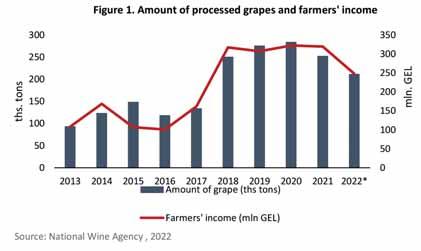
PRICE HIGHLIGHTS
DOMESTIC PRICES
On a monthly basis, the country’s price levels were steady between June-August 2022. The Consumer Price Index (CPI) remained almost unchanged in August 2022 (with a slight increase of 0.14%) compared to July 2022. While in June and July 2022, consumer prices increased marginally (by 0.2%) over the previous month, showing signs of stabilization after a volatile spring.
Between June-August 2022, monthly prices of food and non-alcoholic beverages, measured by the Food Price Index (FPI), also held steady. In August 2022, food prices rose marginally, by 0.9%, compared to July 2022; while the corresponding month-over-month price changes in June and July were 0.1% and -1.4%, respectively.
From an annual perspective, the CPI continued to grow between June and
Over the last year, food prices in the vegetable sub-category exhibited an upward trend. In August 2022, prices in the vegetables sub-category started to fall: the year-over-year prices of vegetables decreased by 9.6%, while the monthover-month prices dropped by 6.6%. According to GeoStat data, in August 2022, annual price decreases were observed for eggplants (-44.9%), cucumbers (-44.1%), cabbages (-39.9%), beets (-28.9%), peppers (-24.1%), potatoes (-22.2%), carrots (-19.8%), and tomatoes (-4.3%). Meanwhile, upsurges in price were seen with onions (21.3%), greens (6.2%), dry beans (4.8%), garlic (4.5%), and green beans (4.2%) (Figure 2).
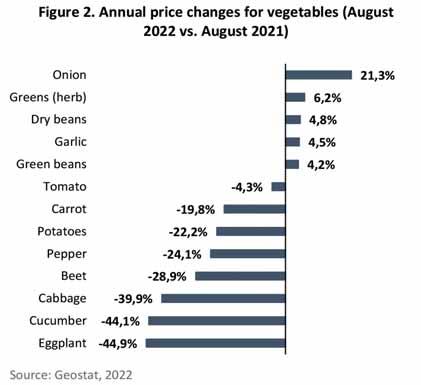
Declining vegetable prices might be the result of increased production, or the so-called base-year effect. In 2021, vegetable production dropped by 15% – from 176.1 to 149 ths. tons. The average yield of vegetables in 2021 also decreased by 7% – from 11.1 to 10.3 tons per ha. Such a decline in domestic production and productivity level pushed vegetable prices up in 2021, and therefore might have influenced swelling prices and increased imports across the first half of 2022. Between January-July 2022, the import value of vegetables was higher each month compared to the same months in 2021. Whereas, the import of vegetables decreased by 28% in August 2022 compared to the previous August.
Meanwhile, the export value of vegetables rose more than three times during the same period. Although the statistics for domestic production are not yet available for 2022, a decline in imports and growth in exports might indicate an increase in the domestic production of vegetables.
INTERNATIONAL PRICES
Between June and August 2022, international prices registered their fifth consecutive monthly decline, however they remained well above the levels of the previous year. In August 2022, the Food Price Index, measured by the Food and Agriculture Organization (FAO), increased drastically – by 7.9% over August 2021. Notably, prices increased within the dairy (23.5%), cereal (11.5%), and meat (8.2%) sub-indices. Meanwhile, prices decreased in the categories of sugar (-8.4%) and vegetable oils (-1.5%).
In August 2022, the UN-brokered Black Sea Grain Initiative helped restart the export of wheat from Black Sea ports in Ukraine for the first time after five months of interruption, thereby bringing downward pressure on the monthly prices of
grains, cereals, and oils.
TRADE HIGHLIGHTS
In 2022, total exports between JanuaryAugust reached 3,571 mln. USD compared to the 2,608 mln. USD from JanuaryAugust of 2021 – corresponding to a strong 37% annual increase. Equally, agricultural exports showed a relatively moderate, however, still notable 10% increase (from 683 mln. USD in Jan-Aug 2021 to 750 mln. USD in 2022). Overall, the share of agricultural exports in total exports decreased from 26% in 2021 to 21% in 2022.
Total imports also demonstrated significant intensification, from 6,126 mln. USD in 2021 to 8,365 mln. USD in 2022 (37%). Agricultural imports closely followed this trend and also increased by exactly 37% – from 812 mln. USD in 2021 to 1,111 mln. USD in 2022. Correspondingly, the share of agricultural imports in total imports has remained unchanged and remained at 13% for both years.
Based on these abovementioned trends, trade continues to play an important role in economic recovery. Although the national currency appreciated during the summer, exports still managed to maintain a significant positive trend. At the same time, currency appreciation might have played a role in boosting imports.
In July of 2022, total monthly exports reached a record high value of 542 mln. USD, amounting to a notable 40% increase compared to July 2021 (386 mln. USD). Similarly, agricultural exports rose from 104 mln. USD in July 2021 to 125 mln. USD by this July (a 20% increase). Aside from the well-known top five export commodities, we can also observe a significant increase in the export of fresh fruit in July, specifically apricots, cherries, peaches, plums, and sloes.
The export dynamics of these particular fresh fruits over the years has been depicted on the Figure 3. During the last few years, this food category saw a notable increase (64% on average from 2016), which was also present in 2022 (30 mln. USD in the January-August period). The trend is most likely related to increased domestic production paired with increased exports to Russia, which acts as the main destination market for Georgian fruit export. Exports to Russia have showed an upward trend since the ban on the import of agricultural products from Georgia was lifted in 2014. Since that stage, the dependence of fruit exports on the Russian market has significantly increased, resulting in higher production but lower market diversification.
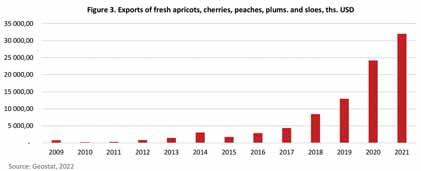
The highest growth is seen for milling industry products, which increased almost seven times – from 1,892 ths. to 14,780 ths. USD (681%). This can be
explained by rising international wheat prices and the ongoing war in Ukraine, both hindering import from Georgia’s main trade partners. A significant jump was also seen in vegetable plaiting materials, from 6 ths. to 30 ths. USD (369%), and followed by an increase in the import of live animals, by 85% from 2,018 ths. to 3,743 ths. USD. For vegetable saps and extracts, it stands at 82% growth, from 162 ths. to 295 ths. USD. Lastly, the respective changes in import values for edible products of animal origin showed an 80% rise, from 8,212 ths. to 14,753 ths. USD (Figure 3).
POLICY WATCH
Technical Regulation on Food (Feed) Additives will come into effect on 1 June 2023
Within the framework of legislative approximation with the European Union, the Government of Georgia developed and approved a draft resolution – the Technical Regulation on Food (Feed) Additives – which will come into force on 1 June 2023. The technical regulation determines an approved list of vitamins and minerals, as well as their chemical forms, permitted to be used in the production of food and feed supplements.
Any business operator who places a food (feed) additive on the market will be obliged to notify the National Food Agency in advance and submit corresponding food samples. These supplements must meet the requirements determined by the technical regulation, otherwise a business operator will not be permitted to sell on the market.
For more information follow this link: https://mepa.gov.ge/En/News/ Details/20929/
There will be an amendment to the National Waste Management Strategy of Georgia 2016-2030
On 8 August 2022, the Government of Georgia made the decision to amend the National Waste Management Strategy of Georgia 2016-2030, and to develop the New National Action Plan 2022-2026.
Under the amendment, four new strategic objectives – improvement in hazardous waste management and plastic waste management, the creation and implementation of biodegradable waste collection and treatment systems, and improved management for inert, construction, and demolition waste – will be added to the nine existing goals within the strategy. The Ministry of Environmental Protection and Agriculture will coordinate implementation of the strategy, as well as the National Action Plan for Waste Management.
For more information follow this link: https://mepa.gov.ge/En/News/ Details/20960/
Helena Bedwell Meets the “Deserters”
BLOG BY HELENA BEDWELLLastMonth, I was lucky to witness a very extraordinary event, something of a “God’s payback,” when I went to the beautiful Kazbegi (Stepantsminda) about 20 minutes’ drive from the Larsi checkpoint.

Russian men and their families had flooded to the border as speculation grew that the Kremlin might bar mobilization-eligible men from leaving the country. I saw days and multiple hourslong lines at the main land crossings into Georgia as reports spread that those subject to the call-up may be prevented from leaving. The government sought to assure people that the rules of the “partial” mobilization that President Vladimir Putin declared on September 21 would be enforced after stories of ailing, old or otherwise exempt people being conscripted went viral.
Ketevan Kovziashvili, spokeswoman for the Georgian Ministry of Interior, told us: “I would not say there is increased traffic from Russia or more than usual; the Larsi border has always been very busy in the past several years due to tourism, transit, and the customs and revenue services already reported that the checkpoint is working in order, 24/7, and no suspicious activity is noted. I know there are some queues, but this is not something we can check from our side as it's not under our legislation or authority.”
The ministry statistics showed 260,810 Russians arrived in Georgia in August alone, followed by Armenian and Turkish, and doesn't report an immediate sharp rise following Putin's announcement, a view which is not shared by the opposition parties and organizations.
Transparency International sees serious risks in the Russian economy's dependency on remittances and trade, adding that in just the March-June period, as many as 6,400 Russian companies registered in Georgia, which is 7% higher than last year.
March- July statistics showed that 1598 Russian citizens received Georgian citizenship and application numbers rose by 54 %.
I
the right thing to say about this exodus, so I decided to
tell the stories of those I interviewed and leave it to the readers to judge.
Daniil, a 35-year-old software programmer, was at the end of his working day in St. Petersburg when Putin made his announcement of partial mobilization for the war in Ukraine. He knew he had to act fast. Having the previous experience of fleeing Russia in February when the war began, then going to India, he later returned. Now he is adamant he will not make the same mistake again. He heard Georgia was easy to get into as no visa is required and he has many Russian and Belarusian friends here.
I met him at a mutual Russian friend's birthday party in central Tbilisi, where many other Russians had since joined him.
“I come from Russia, let's not name where, because I do not underestimate the power of Putin's propaganda. I ended up working in St. Petersburg. When my mom came to visit, I took her to the Navalny support rally. She was shocked to see all these people gathered without any violence or any of the things she’d heard on the television about gays, transsexual people and others- it was simply people holding posters, flags and singing.
“Not wanting to fall under the mobilization requirements, I bought a ticket to Vladikavkaz and told my friends I was renting a van. The prices were high- the van ride was three times the usual price and we paid 10k Rubles each and joined the almost 10 km queue. I was so worried when I was in Vladikavkaz that Russia would announce a total ban on
the male exodus; [but if they’d stopped me at the border], I was ready to go prison or find another way to leave.”
Daniil told me he had lost his job at a big company he had worked at for several years, but he did not really care as his plan was to start a new life and find new job opportunities with his technology background, and Georgia appealed to him as the Russians here stick together more and help each other.
“When arriving at the border, I was preparing for the conversation with the Russian customs authorities and even deleted some chats and pictures on my phone, but to my amazement, they never asked anything. Others were questioned much more rigorously! The wait at the border was 24 hours, and it was worth it as I am here now. I hope my other friends will get out too. I’m waiting for them,” he says.
Artem, a 25-year-old student who has served in the army, was at his girlfriend's place when the news came.
“One of my friends was in Makhachkala. He said, come over, fly here, and we will go straight to Tbilisi. I looked at my watch. I only had three hours! I grabbed my backpack and whatever stuff I had at my girlfriend's house, then called my dad and told him I was leaving. He replied, 'go ahead, son.' I did not manage to speak to my mother because I had to catch that plane.
“After arriving in Makhachkala, we met at a small cafe and arranged a taxi to Vladikavkaz. There were four of us, so renting a car was not difficult, but we were warned about the 10 km queue at the border. It was difficult to sleep through the waiting period because what kept me awake was the fact that I would be questioned or even turned away since I was young and had served before. I was even debating with my friends about going to Belarus instead, and then someplace else, but Georgia was closer, and my sister was living there, which kept me optimistic.
“I didn’t bring my military card with me because I don't trust Putin. He needs lots of people for this war. Possibly, he is aiming at a one-to-one ratio in this war, and it's quite possible he will call for total mobilization, who knows? But I know there are plenty of weapon reserves in Russia. I doubt there will be a shortage of them; they will reopen those reserves. I don’t want to think deeply about it, it makes me feel bad!
Whenever Putin's ratings plummet, every time this happens, he begins wars, in Georgia, Crimea, and this one!”
Nikita, in his 20s, said at the Larsi crossing: “I was travelling over 24 hours. I paid a bribe of 4550 Rubles, and finally made it [into Georgia]. I have not seen it, but was told some people were turned
away. I don't qualify for the army, but how can the system be trusted?”
Vova, 30, from Moscow, on a bike with a child, told us the “scenes were truly apocalyptic, like in the movies.”
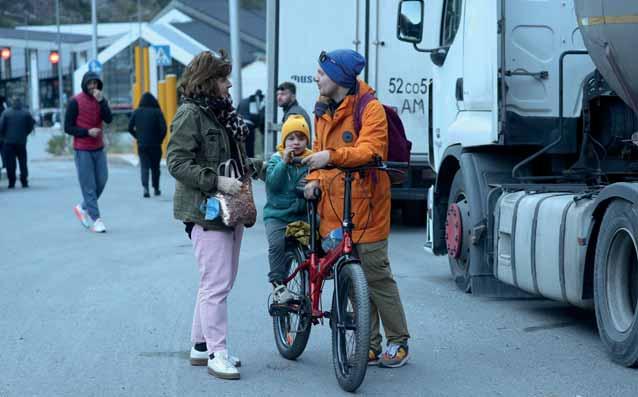
He had decided to split the family, and got a bike and took his youngest child.
“My wife stayed in the car with our older child. I was not in the reserve, but the whole ambience is sick and volatile in the country.”
Alexander was in a group of Russians and Belarusians that had set up a table at the checkpoint to help those in need of first aid and snacks. He said the group chats showed there was a need for it.
“First of all, thank you, Georgia, for allowing Russians to flee. We thought it was important to give the new arrivals important information and some hot tea or coffee and snacks, so the newcomers are exhausted and totally ripped apart by the customs officers from the other side can feel some relief. I left Russia once when the war began, and my parents convinced me to come back. I regret coming back and will never do it again.”
Igor, 30, from St Petersburg, a trainer for triathlon and swimming, said he was “sorry.”
“I apologize, it is our fault, we let the Russian leadership do it, we waited too long, we allowed this,” he said. “As soon as Crimea happened, I said to my wife ‘let’s go,’ but we hesitated, then she got pregnant, and now I had to leave her there with our child. I’m going to Armenia, where I'll start a business as a personal instructor.”
Others I talk to tell me they have not personally seen the mobilization units but saw some military, and the toughest part is the neutral zone.
Anzor, 30, from Chechnya: “I slept on the floor for a week. The Ossetian and Georgian sides saw some threat in us, and maybe that's why they finally let us in. We have relatives in Georgia. I won't be going to that mobilization to fight in Ukraine, no way.”
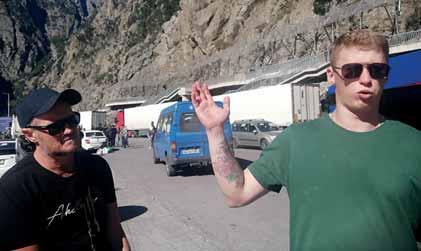

Georgian anger grows. I get notes and messages and comments on Russians that say they are awful and should not be allowed in. Georgians are fed up after Covid and then the Ukraine war, though that is mostly online. I admit I was surprised to see no mass rallies like Gavrivolov Night against the inflow of Russians. I think the opposition is weak, and trust is too low to follow them.
Another side that strikes me about this exodus is the way the runaway people treat their pets- they are everywhere with their owners, cats, dogs, in cages, being held, or simply walking on a leash. I am glad these people didn’t forget the humane side of the crisis. At least there is that.
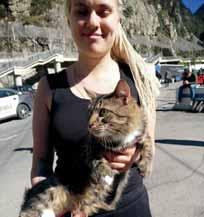
I apologize, it isour fault, we let the Russian leadership do it,we waited too long, we allowedthis
Glory Gates II: Etseri, Svaneti
BLOG BY TONY HANMERIt
was by no means the fault of my Iranian/American gate and fence team that weather was a real challenge to their finishing work, with a deadline looming back in Tbilisi.
Near-continuous rain several days running made things especially difficult, particularly when there was electricity involved, such as with welding. It also didn’t help with concrete works. But they did the best they could, and then left with our great thanks. And I found a new trio from among my neighbors to finish the job.
Two main parts remained: the rest of the concrete work (mostly along the new fence), and some additional gate-work where the sloping lay of the land meant some long thin triangles under which piglets would certainly be able to enter and wreak havoc, as they are wont to do.
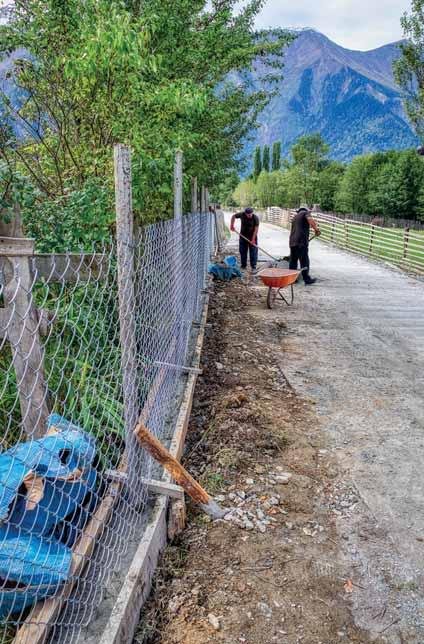
The fence needed wooden sides into which to pour and contain the concrete.
We always have extra planks on hand thanks to ongoing building work in general, so this was easy to do. I was struck once again, however, with how much difference a little knowledge makes here.
We tore out the old, wired-together oak post and pine plank fence to make room
for work. Then the men gathered the necessary planks and began laying them in place, using a simple twig to measure and keep regular the space between them.
They also nailed across some smaller pieces to hold both sides together in this configuration and make it rigid against the weight of the several tons of concrete which they must shovel in. This would cover not only the bases of the new steel fence-posts (already each in its own hole with preliminary concrete to hold it in place) but also the whole bottom few inches of the wire fence, so that nothing could burrow under it. (I’m looking at you, again, piglets.)
This simple and logical structure is likely the minimal solution for the job, and I always find such things attractive.
It’s like discovering a one-ingredient food, like porridge oats, which I typically want to award for its simplicity.
Of course, you must know the proper ratios of cement, sand and gravel to make a good cement, thinned with water. And have the right weather (dry and staying above freezing) through its drying period of up to a couple of days. The ancient Romans knew these things a couple of millennia ago, and their structures near coasts are a rare example of a material being strengthened over time, rather than corroded to destruction, by salt water. Did they know this too?
We won’t be addressing the concrete driveway issue yet, so the spaces under the gates must be filled in with the extra welding soon, because all it takes is a single incursion of porcine saboteurs for damage to be done. They dig up land most efficiently looking for edibles under it, like roots, and leave quite a mess. The conventional wisdom here is that if anyone’s livestock gets onto your land, it’s your fault for not having adequate preventive measures, not theirs! As long as we’re all on the same page, we can all do what is necessary.
Not knowing the technical details, or having the sheer strength alone, I am most grateful that some of my neighbors are on call for such tasks as these. It also supports the local economy, which in my eyes and theirs is an added bonus. Started by foreigners and finished by locals, our winterization project is looking good.
Tony Hanmer has lived in Georgia since 1999, in Svaneti since 2007, and been a weekly writer and photographer for GT since early 2011. He runs the “Svaneti Renaissance” Facebook group, now with nearly 2000 members, at www.facebook.com/ groups/SvanetiRenaissance/ He and his wife also run their own guest house in Etseri: www.facebook.com/hanmer.house.svaneti
Georgia Harnesses Japan’s Experience in Sustainable Forest Management and Environmental Tourism
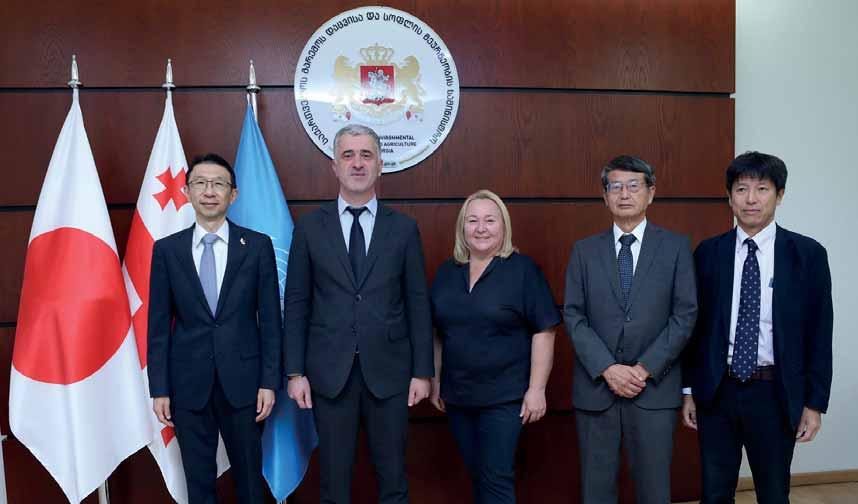
its functional purpose. I thank the Government of Japan and UNDP for providing fi nancial and technical support for this initiative.”
“Japan’s forest resources have tripled over the past 50 years, now covering around two-thirds of the country’s territory and contributing to our ambitious plan to achieve carbon neutrality by 2050,” Ambassador Imamura said. “We are honored to share this experience with Georgia, help protect a fragile forest ecosystem and explore the environmental, economic and social benefits.”
“Our joint work with the Japanese Government and the National Forestry Agency provides around 43,000 people with easy access to sustainably harvested firewood for heating and other needs,” UNDP Deputy Resident Representative Anna Chernyshova noted. “We are piloting sustainable forest management in Mtskheta Municipality, hoping that the same model can be expanded to Georgia’s other regions.”
Aspart of its ambitious climate pledge, Georgia is shifting to sustainable forest management, aiming to better protect its lush forests, reduce emissions and promote sustainable living. To assist the country in achieving these goals, Japan and the United Nations Development Program (UNDP) work in partnership with Georgia’s Ministry of Environmental Protection and Agriculture, the National Forestry Agency, municipal authorities and local communities to introduce forest management practices that benefit nature,
people and the economy.
On 26-30 September, two Japanese experts visited Georgia to share their experiences and offer practical recommendations in the fields of forest management and environmental tourism. Mitsunobu Onishi and Toru Inada met with representatives of the National Forestry Agency and the Mtskheta Municipality. They also visited a newly opened Business Service Yard in Bodorna village and forest sites in Mtskheta Municipality where Japan and UNDP are supporting alternative solutions to illegal logging while promoting sustain-
able living and raising awareness about forest protection.
The experts presented their findings and recommendations on 30 September, at a high-level workshop that brought together representatives of the state agencies involved in forest management and environmental protection.
Otar Shamugia, Minister of Environment Protection and Agriculture; H.E. Imamura Akira, Ambassador of Japan to Georgia; and Anna Chernyshova, UNDP Deputy Resident Representative in Georgia, addressed the participants with welcome remarks.
“Climate change is a huge challenge for Georgia and the world,” Minister Shamugia said. “We need to introduce adaptation and mitigation measures in all sectors to address emerging threats. Sustainable forest management is an essential part of this agenda. The expertise and support provided by our international partners are crucial to fulfilling Georgia’s commitments in this area. The new project contributes to the ongoing forestry reform and helps us establish sustainable forestry sites in Mtskheta Municipality to manage the forest in line with
With $920,000 in funding from Japan, UNDP assists the National Forestry Agency to build, develop and improve Business Service Yards and ensure that they provide quality services to local communities. By the end of 2022, a new Business Service Yards will be established in Jighaura village. Two more Business Service Yards in Dzegvi and Qvemo Lisi will be equipped with allterrain vehicles and firefighting tools. Local foresters will be trained in sustainable forest management and vulnerable families from the nearby villages will receive energy-efficient stoves. UNDP and the National Forestry Agency will also carry out an information campaign to let people know why forest protection is so important.
This support is part of UNDP’s global Climate Promise effort to assist 120 countries and territories to achieve their climate goals. Georgia is one of 23 countries and territories where Climate Promise is funded by Japan, the largest supporter of this pioneering and groundbreaking initiative.
Vogue: Georgia’s Kartli Region among 12 Underrated Wine Regions to Visit This Fall
Vogue
has included Georgia’s Kvemo Kartli region among the 12 underrated wine regions around the globe that should be visited this autumn.
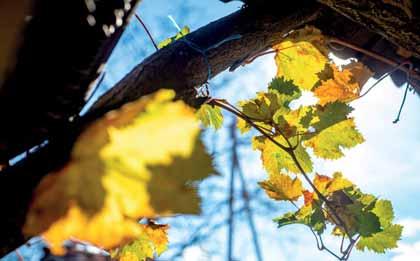
Among the most distinguished but yet less-known wines worldwide, the article written by Nicole Cliest also mentions a wine produced in Georgia’s Kvemo Kartli region.
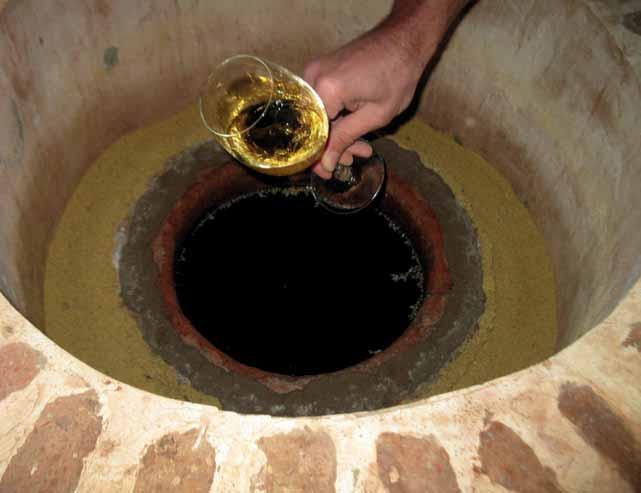
“As the world’s oldest continuously producing wine region, one might expect Georgia to be more ubiquitous—but there’s a reason it still feels unknown,” notes the author.
“The Republic was under Soviet rule for decades, and wine culture was greatly impacted. Only four grape varieties (out of over 500) were allowed in production; the others were kept alive in secret,” natural wine journalist and author Rachel
Signer says. “With Georgia’s independence, they rediscovered their wine culture and began sharing it with the broader world. If you’re orange wine obsessed, the country’s skin-contact whites are likely already on your radar. This style involves harvesting white grapes and allowing them to ferment, as opposed to pressing the juice right away. This fermentation allows the juice to gain color, flavor, and texture from the grape skins,” Signer explains. “It results in a completely different wine, which has the floral elements of a white wine but the tannins of a red.”
Signer notes that Kartli is relatively easy to visit due to its proximity to the ancient city of Tbilisi, less than an hour away by car. While there, she suggests a visit to Iago Bitarishvili, of Iago’s Wine, and his wife Marina Kurtanidze, who makes a wine called Marina. “It’s dif
cult to imag-
Tbilisi IV International Summit of Crafts and Design- ETHNOFEST to be Held Next Week

Tbilisi IV International Summit of Crafts and Design- ETHNOFEST-2022 is to be held on 14-15-16 October at EXPO GEORGIA. The summit is one of the largest platforms for craft makers, designers, entrepreneurs, retailers, experts, commercial agents, buyers, and the general public in the South
Caucasus region.
The Summit offers a unique opportunity for local and international craft makers to present their handmade products, get feedback from local and international buyers and commercial agents, establish business contacts, find new customers and get access to local and international markets.
The Summit enables local and inter-
PUBLISHER & GM George Sharashidze
Commercial Director:
Merabishvili Marketing Manager: Natalia Chikvaidze
Davies
national customers to purchase handmade products directly from their creators and through face-to-face communication with the artisans discover more about the purchased item. ETHNOFEST is the place, to create economic opportunities for and with crafts makers in order to meet the challenges, accomplish their goals, and develop their businesses.
Journalists: Ana Dumbadze, Vazha Tavberidze, Tony Hanmer, Emil Avdaliani, Nugzar B. Ruhadze, Michael Godwin, Ketevan Skhirtladze, Mariam Mtivlishvili, Erekle Poladishvili, Sophie Hodler
Photographer: Aleksei Serov
Website Manager/Editor:
Davies
Layout: Misha Mchedlishvili
Webmaster: Sergey Gevenov
Circulation Managers: David Kerdikashvili, David Djandjgava
is incredibly interesting,” she explains. “And if they offer you a meal, do not refuse!”
